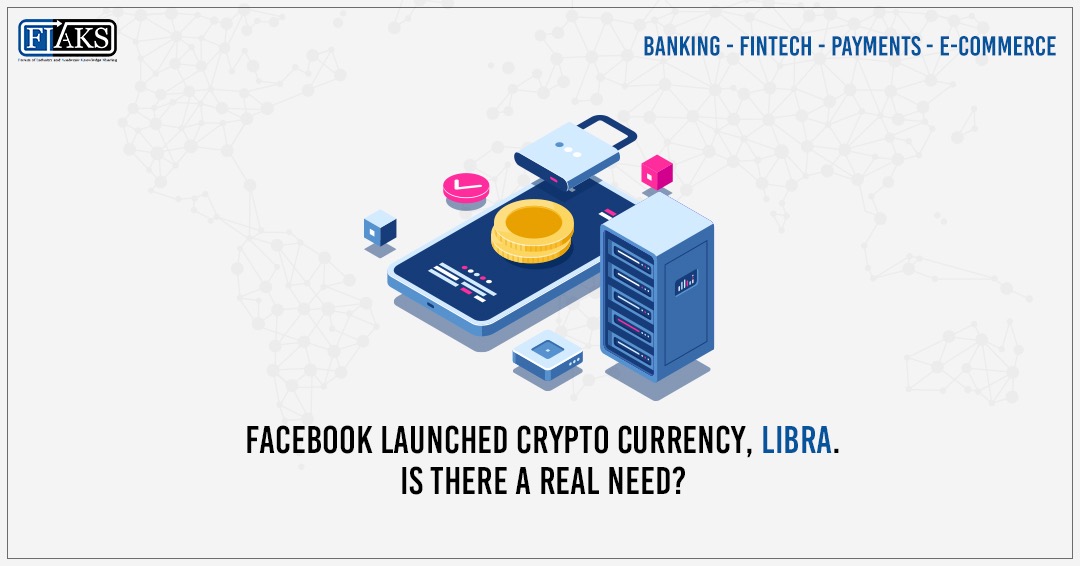Several Founders, Co-Founders, CXO Bankers, CXO Fintech professionals & people who participated in the ePanel discussions are:
- Mr. Probir Roy, Co-founder, Paymate
- Mr. Sandeep Todi, Co-founder, Remitware Payments Inc
- Mr. Manish Jeloka, Former Executive Director Wealth Market Product and Sales, Standard Chartered Bank
- Mr. Sunil Kulkarni, Joint Managing Director, Oxigen Services (India) Pvt Ltd
- Mr. Kamonasish Aayush Mazumdar, Chief Marketing Officer, MeraEvents
- Mr. Arun Tanksali, Co-founder & CTO, Nearex
- Mr. Ajay B Panicker, CEO & Founder, NetPay Limited
- Mr. Neeraj Chandra, Head of Operations, Abu Dhabi Commercial Bank
- Mr. Vikas R Panditrao, Co-Founder, Forum of Industry Academic Knowledge Sharing
- Many other CEO/CXO Bankers & Fintech professionals on FIAKS Forum
Facebook’s recent launch of cryptocurrency Libra, concerns its co-founder Chris Hughes. Chris quotes that, “Libra has a long way to go before being successful, but in theory, it’s “brilliant” and “frightening”.”
Our experts view Libra, as an absurd attempt by Facebook to leverage its user base and to create an alternative payment system. In their opinion, crypto enthusiasts abjure the fact that crypto has to compliance with fiat. It is not a replacement, rather a way of providing an additional payment mechanism.
The quintessence of a reliable monetary system is that nothing becomes obsolete. For e.g. Coins didn’t dissolve when currency notes were introduced, and on parallel lines currency notes didn’t disappear when credit cards were introduced.
The principal motive, in fact, should be, to recognize the underlying monetary system and build a process of accelerating payments within that system. The imperative requirement is a blockchain induced based payment instrument instead of a coin that started trading itself. Therefore, which gave rise to governments across the globe having different approaches to cryptocurrency. Some appreciating the approach, while others having an ostrich approach.
Though the acceptance of cryptocurrency has a long way, the payment system in the future may not have a lot of intermediaries. These intermediaries include the three people who need to exist for a transaction i.e the buyer, the seller, and the person who oversees the transaction by standing a guarantee. The overseer cannot be the buyer or seller. However, people opt to make a currency that they control, oversee, and build a business on.
Even though these 3 parameters shouldn’t be covered by a single person, such a system will exist at some point in future. This situation might occur because the world now has a value creation and value distribution system which is controlled by private parties. The consequence of this would be a system of payments which would be completely dominated by the internet.
The similar, fundamental problem is with the bitcoin. Bitcoin is a store of value and seeks to replace other value-based systems (fiat currency). It had the capacity to solve a much bigger problem but failed as it tried to create a trading market for itself.
The means of production is mostly privatised and the only limitation is electrical power and processing power, both of which can be rented on demand. The government has a progressively lesser role to play. Hence, anyone on the internet economy can produce goods, product, services, and get paid for it.
Facebook and other similar players trying to create a “coin” would attract a lot of public interest and speculation. However, the real question or fear of Government is how to control a form of currency that is non-inflatable / non-deflatable / non-accounted / non-taxed.
Our experts believe that these challenges are bound to incur at the micro-level, due to business operation by small players who are unknown and won’t be completely driven by a major player.
Recently Visa and MasterCard have invested in Calibra. Also, an interesting angle, which can impact Facebook’s step is the emergence of national digital currency which is fully backed by the government and represents fiat. This currency will be a legal tender and building payment apps on top of this will create a strong crypto payment movement. This would have a high awareness level and acceptance rate by the local vendors.
With these national level cryptocurrencies fully functional and backed payment systems, it would play an important role in creating a sustainable and stable framework for global payments.
With no player planning to miss out on the bandwagon. Mastercard and Visa recognize that their payment systems are being challenged. They do not have the reach to create a viable alternative. So it’s a small investment from them to wait and observe.
If the cost of a transaction is the same and super accounted/controlled, why should people opt for cryptocurrency?
Well, if the government initiates this payment methodology, there would be people who opt to use this option. The only thing required is the economic model where payment transmission creates a revenue opportunity. That does not necessarily have to be transaction fees, it can take other forms.
Our experts feel that it may seem to counter-intuitive but the biggest hurdle for Libra’s growth is that the majority of the people are backing it openly. However, they will only push it, but the ideological fraction may not go behind this initiative, which means Libra will perform reasonably good because of the push but may not expand a lot unless there is a clear economic incentive, which would be majorly be backed by the government.
Our experts’ opinion’s that China will never have any form of a crypto coin that does well. As it is a superstate controlled country which will never back any form of cryptocurrency.
Register and Read the entire discussions

